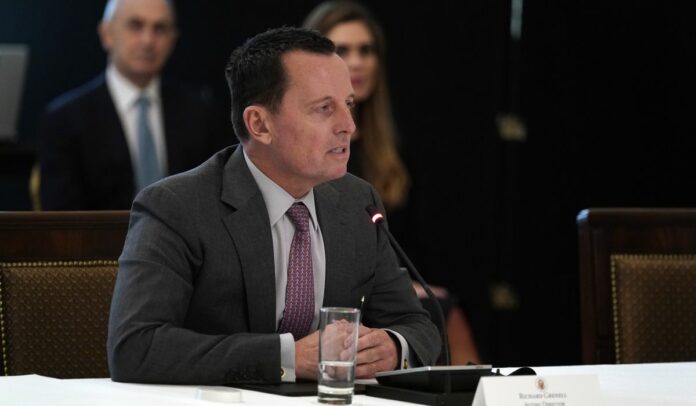Acting Director of National Intelligence Richard Grenell has moved to “streamline” briefings to political campaigns on foreign threats to make sure each side receives equal treatment, an official told The Washington Times.
In 2016, with Russian intelligence hacking Democratic Party computers, U.S. intelligence provided the Hillary Clinton presidential campaign with what is called a “defensive briefing,” but it did not give the same to the Trump campaign. In fact, the FBI decided to use a general threat overview session on Aug. 17, 2016, as an opportunity to spy on then-campaign adviser Michael Flynn.
That year, intelligence threat briefings for political campaigns and officer holders were conducted by three agencies: the Office of the Director of National Intelligence (ODNI), the FBI and the Department of Homeland Security.
Mr. Grenell now has put one official in charge: the director of the National Counterintelligence and Security Center (NCSC) under the DNI. Right now, that is Bill Evanina, who days ago retired as an FBI agent after winning Senate confirmation. He has held the job since 2014, before it became a Senate-confirmed post.
Mr. Evanina will lead the presidential briefings and bring in the FBI and the DHS as needed.
“This insures you have uniformity for both sides,” the ODNI official told The Times. “It puts one person in charge … He could coordinate if he wants.”
An ODNI statement said: “This change represents an important improvement and simplification to the threat notification process. The IC [intelligence community] will continue to work in partnership with FBI and DHS to identify and integrate threat information, and Evanina and the elections team will act swiftly to deliver the timely and thorough assessments to those affected by potential malicious influence.”
The threat of Russian interference already is hanging over the 2020 election.
The House Permanent Select Committee on Intelligence received an ODNI briefing in February about election security and Russian intentions. The briefer reportedly said Moscow wants President Trump reelected.
The briefing was immediately leaked to the news media — an event Republicans blamed on committee Chairman Adam B. Schiff’s side of the aisle.
White House officials said they had seen no such intelligence. When ODNI briefed senators the next month behind closed doors, it also released a non-classified assessment which did not say Russia is helping Mr. Trump.
“Russian social media and state media messaging has taken aim at some of the candidates from both parties, in part to signal Russia’s unhappiness with policy statements or choices,” the assessment said. “The IC has not concluded that the Kremlin is directly aiding any candidate’s reelection or any other candidates’ election. Nor have we concluded that the Russians will definitely choose to try to do so in 2020.”
The assessment also said: “This is not a Russia-only problem. China, Iran, other countries like North Korea and Cuba, and non-state actors all have the opportunity, means, and potential motive to interfere in the 2020 elections as a way to achieve their goals. Some are trying to influence the public debate largely on social media in order to stoke discord in the United States, with the hope of swaying U.S. voters’ preferences and perspectives, shift U.S. policies, and undermine the American people’s confidence in our democratic process.”
In the future, Mr. Evanina will deliver such congressional rundowns or pick the briefers.
In January 2017, outgoing Obama intelligence officials concluded that Moscow tried to help candidate Trump by hacking Democratic Party computers and going to war against Mrs. Clinton on social media.
The Senate Select Committee on Intelligence concurred in a bipartisan report. House Republicans, led by Rep. Devin Nunes of California, balked. They say the report ignored evidence that the Kremlin wanted to hurt the Trump campaign.
One 2016 development is clear: the Clinton camp received a full-throated intelligence briefing on Russia and the Trump team did not.
Then-FBI Deputy Director Andrew McCabe and counterintelligence chief Bill Priestap concluded they should not tell Team Trump what the Russians were up to because they were investigating whether the Republicans were involved, according to a report by Justice Department Inspector General Michael E. Horowitz.
“Priestap stated that he considered whether the FBI should conduct defensive briefings for the Trump campaign but ultimately decided that providing such briefings created the risk that ‘if someone on the campaign was engaged with the Russians, he/she would very likely change his/her tactics and/or otherwise seek to cover-up his/her activities, thereby preventing us from finding the truth,’” the report said.
The report also said: “McCabe said that he did not consider a defensive briefing as an alternative to opening a counterintelligence case … The FBI did not know if any member of the campaign was coordinating with Russia and that the FBI did not brief people who ‘could potentially be the subjects that you are investigating or looking for.’ “
Special counsel Robert Mueller concluded his investigation by saying he didn’t establish an election conspiracy between the Trump campaign and Russia.






